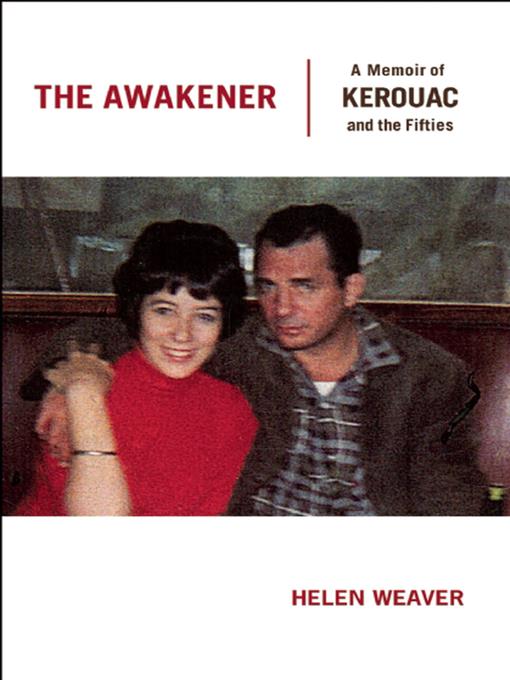
The Awakener
A Memoir of Jack Kerouac and the Fifties
کتاب های مرتبط
- اطلاعات
- نقد و بررسی
- دیدگاه کاربران
نقد و بررسی

September 14, 2009
Firsthand witness to the beat literary movement, Weaver (Antonin Artaud: Selected Writings
) pays homage to the man and the writer Jack Kerouac, whom she met and fell in love with in 1956. Befriending Kerouac, Allen Ginsberg and comic Lenny Bruce, she makes these iconic counterculture figures tangible and captures New York's Greenwich Village of the '50s and '60s. The memoir reveals the author's own awakening—from discovering rock and roll through her personal sexual revolution to Buddhism. A lover of words and language, Weaver—immortalized in Kerouac's Desolation Angels
as Ruth Heaper—writes this book “as an act of atonement” to Kerouac: “I rejected him for the same reason America rejected him: he woke us up in the middle of the night in the long dream of the fifties. He interfered with our sleep.” She moves from translator to writer, but states she is “uncertain whether it was the story of my own life or the story of the remarkable people I had known.” Ultimately, it's both. Photos.

October 1, 2009
Beat-era hipster and former love interest of Jack Kerouac recalls her rebellious youth in the Greenwich Village of the 1950s and beyond.
Oberlin grad Weaver moved to New York with an English degree, landed a secretarial job in publishing and found the requisite squalid NYC apartment. Her roommate happened to be friends with the Beat Generation's pied pipers, Kerouac and Allen Ginsberg. Soon enough, Weaver and the handsome literary maverick Kerouac became an item. The author was clearly enamored and slightly envious of the still-penniless Kerouac's vagabond poet lifestyle. In fact, his occupational freedom fueled her desire to transcend the workaday publishing-industry world. Kerouac also represented the antithesis of her conservative, domineering father."Life is a dream," Kerouac often repeated like a protective mantra. For Weaver, though, life became increasingly all too real, as her rigid nine-to-five existence clashed with Kerouac's live-for-the-moment philosophy. When the poet's drunken revelries got out of control, Weaver threw him out—then, naturally, regretted it. After the dissolution of their relationship, the memoir moves in inconsistent fits and starts. Weaver became a sought-after translator and had a serendipitous one-night stand with comedian Lenny Bruce in the mid'60s. Then her life lapsed into common midlife-crisis patterns, including therapy sessions, astrology and self-help gimmickry. She discovered that despite her passion for pot-smoking and rock'n' roll, she could never quite escape her inborn upper-middle-class mores. In fact, she wanted Kerouac to be not only an adventurous writer but also a reliable life partner. As she discovered, you could never have Kerouac the man without the creatively self-destructive Kerouac the artist.
An evocative multidecade portrait of the Beat milieu undercut by the author's mostly pedestrian biographical details.
(COPYRIGHT (2009) KIRKUS REVIEWS/NIELSEN BUSINESS MEDIA, INC. ALL RIGHTS RESERVED.)

October 1, 2009
In the latest in a long line of kiss-and-tell memoirs about Jack Kerouac, Weaver, translator of over 50 books from the French, chronicles her brief love affair with the author against the backdrop of the 1950s in Greenwich Village. She works in publishing, undergoes psychoanalysis, and becomes part of a literary circle that includes Allen Ginsberg, Richard Howard, and Dan Wakefield. Unlike Kerouac, she is swept into the cultural revolution of the 1960s, embracing New Age ideas like Native American spirituality, goddess worship, witchcraft, and astrology. Weaver writes in a clear, straightforward style, candidly discussing her feelings about Kerouac and others, including her roommate Helen Elliott and her rival for Kerouac's affection, Joyce Johnson. Her analysis of Kerouac's life, work, and reputation is intelligent and on target. In the end, Weaver regrets that her own rejection of Kerouac paralleled that of a literary establishment that only came to appreciate him after his death. VERDICT Readers interested in the role of women in the Beat Generation will enjoy this book alongside earlier works like Joyce Johnson's "Minor Characters" and Carolyn Cassady's "Off the Road".William Gargan, Brooklyn Coll. Lib., CUNY
Copyright 2009 Library Journal, LLC Used with permission.

























دیدگاه کاربران